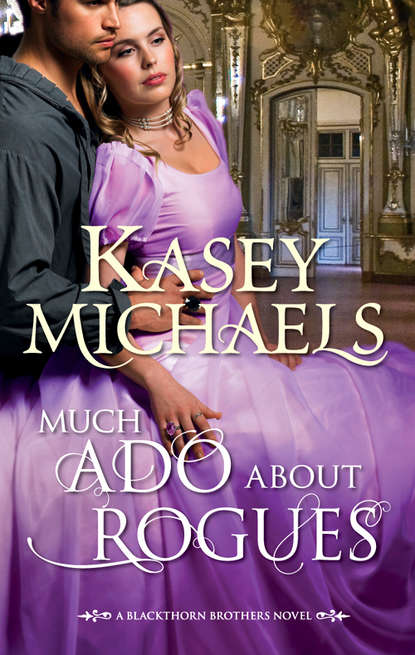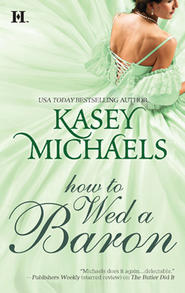По всем вопросам обращайтесь на: info@litportal.ru
(©) 2003-2024.
✖
Much Ado About Rogues
Автор
Год написания книги
2018
Настройки чтения
Размер шрифта
Высота строк
Поля
“I agree, and we didn’t just learn that today,” Dickie Carstairs said, grinning at Will. “Oh, you want to know what we’ve managed to ferret out, don’t you? Very well. Your mentor departed this benighted village eight days ago on the public coach heading north. He carried with him a fairly large trunk, purchased just that morning, and a rather cumbersome cloth bag he declined to place in the boot but actually put down the blunt for its own seat, so that he could keep it with him inside the coach. Although he is well-known here, the bumpkins I spoke with didn’t know they were seeing the marquis board the coach.”
“How so?” Jack asked, if only to keep Dickie talking. He already recognized where this story was leading. After all, hadn’t a part of his training been to pass unnoticed under the eyes of the villagers who had been seeing him almost daily for a year?
“Oh, that. Yes, well, it would seem that the passenger they saw was described as looking much like a member of the clergy. One of those queer, foreign autem bawlers, you know? Wearing skirts, and with a rope of beads with a whacking great cross hanging at the end of it tied around his waist, a hat as flat and big as a platter pushed down over the cowl on his head. Kept trying to trace his blessings on everybody who came close, so the good citizens rather kept their gazes down as they steered around him, trying to avoid gaining his attention. A costume, of course.”
“And a good one if you’re walking where you would otherwise be recognized,” Jack said, nodding. The monk disguise had been among those missing from the collection in the hidden room. There were others. “Go on.”
Jack contemplated his wineglass as Dickie went on to explain that the stranger had taken a private room at this very inn two weeks earlier, appearing and disappearing with no regularity, probably going out and about, saving souls. But always generous with his tips as he asked that his privacy be maintained so that he wasn’t disturbed while at his prayers. He may have slept in his bed, he may not have, no one was certain. Overall, he was quiet and no trouble, coming in and out, always carrying something with him, the same cloth bag already mentioned.
“He was slowly bringing what he needed from the manor, both in the bag and beneath his monk’s robes,” Dickie concluded, stating the obvious. “He couldn’t be seen leaving the place with a traveling trunk, he couldn’t make anyone at the manor suspicious. So he did it piecemeal, and in secret. And no one suspected. Clever.”
Will stabbed another bit of cheese. “Clever enough to disembark at the very next village and hire a wagon for his luggage, then head out again, this time going west. And, before Dickie drags the business out too far, an old lady driving a farm wagon entered the next village, only to ride away in the southbound Royal Mail coach, her traveling trunk on the roof, a large cloth bag beside her. He had to pay for an extra seat again, which is why he was remembered. He’s for London, Jack. He’s in London.”
“May as well be on the far side of the moon, for all we’ll be able to ferret him out in town. He could be anywhere. Anybody.” Dickie raised his wineglass. “And clearly up to mischief. Liverpool isn’t going to like it when we tell him we’ve lost him.”
“We haven’t lost him,” Jack corrected. “We simply haven’t found him yet. We already knew a man like Sinjon wouldn’t make our job easy for us. Tess says she knows nothing. And, from the way he sneaked out of the manor piece by piece, I tend to believe her.”
Will got to his feet, the dagger having already disappeared into his boot. “All right then, we’re for London. I wasn’t much enamored with the idea of passing the night in this benighted spot, not with the delights of the Season and a dozen invitations awaiting us in Mayfair. Except for you, Jack. A thousand apologies.”
“All of which are accepted,” Jack said, also getting to his feet. “Bastards aren’t often invited into Society. I won’t be riding with you, however. We’ll meet in Half Moon Street in two days’ time. Watch for the usual signal that shows I’m in residence.”
“Some people just have the knocker put back on the door, you know,” Dickie pointed out. “All this business about opening drapes, closing drapes. A man could get confused.”
“He don’t advertise his whereabouts the way you do, not our Black Jack,” Will said, giving the pudgy Dickie a slight shove in the direction of the hallway. “You’re going to take another run at the daughter, Jack? Going to bed her for the good of the Crown, or just for the bleeding hell of it? Either way, good on you.”
“Sorry, Jack,” Dickie apologized for Will. “He’s pretty enough, but more than his table manners are execrable. Come on, Will, before Jack bloodies that too-inquisitive nose of yours.”
Jack had already discounted both of Will’s sly comments. He’d learned to ignore a lot of things over the course of his eight and twenty years, or he would have been forced to spend half of that life just knocking people down. As it was, by the time he’d reached his majority he’d gotten himself into trouble often enough to eventually bring him to the attention of the Marquis de Fontaine, who’d shown him an alternative outlet for both his quick mind and his aggressive nature… which had probably saved Jack’s life.
“I don’t have to tell you to begin at the Bull and Mouth. Sinjon’s major problem is his lack of funds, which meant he had to bring his tools with him, not purchase them at his destination. Adding to his problems, his other weakness is physical, not mental. Someone at the Bull and Mouth helped him with that trunk—he clearly couldn’t move it across London on his own. He’s left us a trail, gentlemen, one I’m sure he’s already eradicated, employing the same piecemeal tactics in London to shift his belongings sans trunk. He’s well and truly gone to ground by now. But start with the trunk. Find that, and we’re back in the hunt.”
“Fair enough, Jack. And if we find him while you’re still playing about with the dau—” Will quickly corrected himself “—while you’re still searching for clues here? Do we approach, or wait for you? I rather fancy having the man sitting in your drawing room with a lovely big bow tied around his neck when you arrive. Lady Sefton’s ball is this Friday, you know, and with one thing and another, I’ve damned well missed half the parties already. Liverpool and his missing marquis be damned, I say. We’d been promised some respite after our last brilliant success.”
Jack was used to Will’s grumbles, knowing the man loved a fight more than anything. It was the hunt that fatigued him, the necessary ins and outs of intrigue, especially when, at the end of the day, there’d be no fight. Just an old man, captured and put back out to pasture, or easily dispatched to hell. Where was the fun in that?
“Just find him, gentlemen, or at least a trace of him, and you can safely leave the rest to me,” Jack said, walking with them to the inn yard, and waiting with them after they’d called for their mounts. “After all, the ladies must be pining for both of you.”
“Only Will,” Dickie said, sighing. “Not much use for a pudgy, penniless peer, I’m afraid.”
“Just stay close by me, Dickie, my friend. I’ll toss you my castoffs,” Will joked.
The banter continued until the horses were saddled and brought out, and Jack remained where he was until the two men had mounted them and turned toward the roadway.
He’d been impatient for them to be on their way, although he hadn’t let them see that. They’d been a true quartet of rogues for the past four years, now sadly a trio of rogues, with Jack as their acknowledged leader. That had been fine, at the beginning. Will had been content to let Jack do most of the thinking as, to hear Will tell it, thinking fatigued him. But lately he’d sensed a growing disenchantment with the arrangement in Will, and a burgeoning need for violence, a void left by the cessation of hostilities in France.
With Henry dead, Jack, too, was growing more restless. The Baron Henry Sutton had been the closest thing to a true friend Jack had allowed, and his death had left a void he wasn’t eager to fill. With Henry, Jack was never the bastard son of the Marquess of Blackthorn; he’d simply been a man, the equal of any other man. Dickie was affable enough, but not the sort you sat with until the dawn, speaking of everything from literature, to religion, to the never-ending search to understand how they had come to be here, in this place, in this time and for what purpose.
Henry had known things about Jack’s years with Sinjon, with Tess, that no other man had known. Jack missed that companionship, that quiet understanding, even as he’d been amazed to lately discover there were bonds between his brothers Beau and Puck he’d never suspected, indeed, had always gone out of his way to discourage.
And now Sinjon. And Tess. Both of them, without warning, come back into his life. The mentor. The lover.
Jack felt unbalanced, unsure. He was beginning to question what he’d made of his life, and wonder about the future. He’d never before thought of the future. Only the now. He’d never cared. That’s what had made him so good at his job.
But he had cared, with Beau. He’d cared, with Puck. After promising himself that his mistake with Tess had taught him never to mix his feelings with his mission, he’d let his brothers in, and he’d nearly lost one of them. He had lost Henry.
It was time for this to be over. All of it. He wasn’t suited to the job anymore. Dickie enjoyed the thrill nearly as much as he needed the money the Crown offered for his services. Will relished testing his skills—the sharp, swift justice of the knife—maybe too much. But to Jack, with the war over, he increasingly saw his small band of rogues as nothing more than hired killers, meant to rid the Crown of potential embarrassments. Embarrassments like Sinjon, who knew entirely too much for Liverpool or any highly placed government official to sleep easily at night while the man was on the move.
Yes. Jack wanted out, as had Henry. They’d discussed the subject many times, and each time concluded that once you belong to the Crown, as they did, there was no such thing as simply walking away. Sinjon had proved that, as well. He’d been all but a prisoner on his small estate, his every move monitored and reported. Only an old man, broken in spirit and no longer of any use to them, but still a marquis, a fellow peer, so they hadn’t killed him. There’d be no such reticence in eliminating a bastard son barely anyone knew and only a few might mourn if he attempted to cut free.
And Jack felt reasonably certain he knew the tool the Crown would employ for the job, should that time come. He took one last look toward the now empty road, and headed back into the inn for another glass of wine and time alone, to think.
CHAPTER THREE
TESS PACED THE drawing room, twisting the wineglass between her fingers. He was late. Jack was never late. He was doing this deliberately, delaying his arrival, drawing her nerves taut, making it clear to her that he had the advantage over her in every way.
Which he did. More than he could possibly know.
She’d never forgotten him, saw his face every day; he was always with her.
When he’d gone, she’d believed it would be forever. Black Jack Blackthorn didn’t grovel, didn’t bend. Would never beg. She’d handed him back his ring, the one she’d worn on a thin ribbon around her neck, hidden away from her father’s eyes until this one last assignment was over, and exchanged it with the locket closed over the miniatures of her mother and brother. She’d replaced one lost dream with two lost souls.
He’d been wearing the ring today; she’d seen it on the index finger of his right hand. Heavy gold, with a large, flat onyx stone engraved with a B. For Blackthorn. For bastard. He’d said he had never known which, as the gift had been from his mother. But, although she’d encouraged him to enlarge on that strange statement, he had instead diverted her with his kisses, and he’d never mentioned his mother again. There hadn’t been time. There had been their argument when he’d told her of the change in tactics that would put her in the background, away from any possible danger. There had been the mission.
And after that, there had been nothing left but the funeral.
And goodbye.
If only there was some way to go back, to change the past. But there wasn’t, and that meant the future couldn’t be changed, either. There was only the now, the mission—finding her father before he did something else that couldn’t be changed, fixed, mended. And this time, she wouldn’t be left behind, to wait, to worry… to mourn.
How she missed René. They’d shared their mother’s womb, they’d shared their lives, always together, living in one another’s pockets, clinging to each other through their papa’s frequent absences, vying for his attention when he was in residence.
Though Emilie spoke only French, their papa insisted his children speak only English in his presence. They were confined to the manor grounds, their only companionship each other and Rupert, their English tutor, who brought home his lessons with a birch rod. He’d most often wielded it on René, until the day Tess had jumped onto the man’s back and nearly bitten off his ear before he could shake her loose.
She’d been ten at the time. When her father heard of the incident it had been the very first time he’d ever complimented her.
But then he’d scolded René in that quietly destroying way he had, for having submitted to the rod so that his sister had been forced to defend him, taking all of the joy out of Tess’s victory. He’d then employed another tutor who was twice the disciplinarian as Rupert, and Tess’s education was turned over to a succession of English governesses.
Rupert’s replacement was discharged the day René had twisted the man’s rod-wielding arm behind his back and run him headfirst into the solid oak door of the schoolroom. He’d been fifteen, and it had taken all of those five long years for him to find the courage his sister had displayed at ten—which their father had been quick to point out.
There was no winning with the marquis. Fail him, and face his quiet disapproval that was ten times worse than any possible beating. Do something right, and hear nothing, or wait for the flaw to be pointed out to you as the stinging hook at the end of the faint praise.
Yet all Tess and René wanted out of life was to please the man. René pretended an interest in the lessons their father began with him after the tutor was sent packing, but it was Tess who showed the most aptitude when René would share what he’d learned with her. Her twin would rather read poetry; Tess would rather hold a book on military tactics up to a mirror, to practice reading backward. René enjoyed playing the flute; Tess practiced for hours with the slim tools René loaned her, until she could easily open every locked door in the manor house. After every hour spent at lessons with his father, René would spend two with Tess, teaching her everything he’d learned until she’d not only mastered each lesson, but outshone her teacher.
The marquis finally found her out the day René accidentally pinked her as they practiced with the foils and the button had come off the tip of his weapon without either of them noticing.
That was the second time the marquis had looked at her with something close to approval in his eyes, as he’d tied his handkerchief around her forearm and ordered her to borrow a shirt and breeches from René and report to him in the gardens. Then he’d tossed her back her weapon and grabbed one for himself.
She’d excelled; she knew it, even if her father never acknowledged any new skill she mastered over the next years. But she’d lost a part of her brother to her success, and to their shared strong desire to please the marquis. René never complained, never said anything, but Tess knew.











